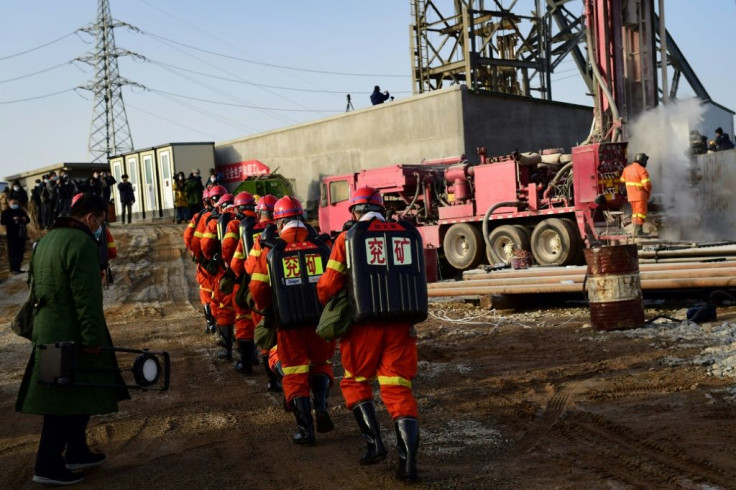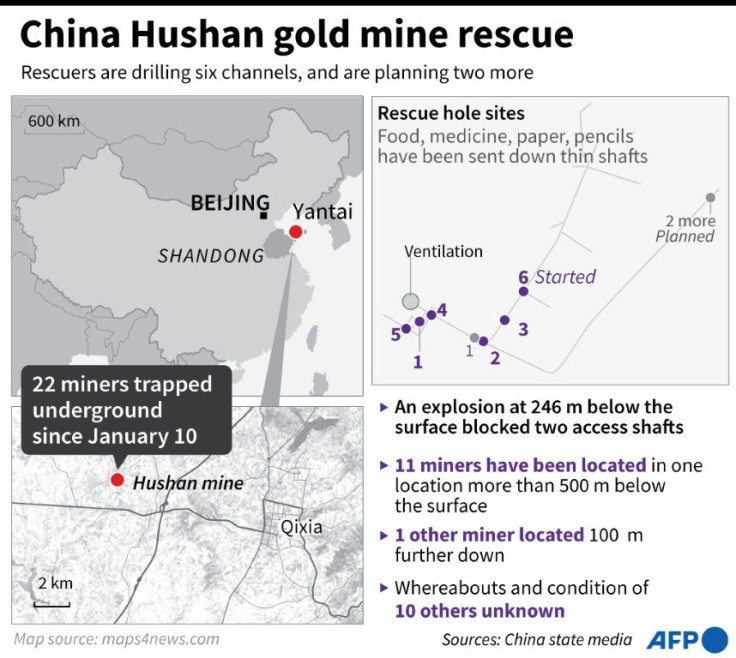Rescue Shaft Offers Hope For Trapped Chinese Miners
Rescuers are widening a communications shaft in the hope of extracting a group of Chinese gold miners who have been trapped deep underground for 10 days in rising floodwaters, state media said Wednesday, with one critically ill and far from medical help.
Twenty-two workers were stuck hundreds of metres underground at the Hushan mine near Qixia city in east China's Shandong province when an explosion on January 10 sealed the entrance and cut off communications.
Contact has been made with 11 miners at one location around 580 metres (1,900 feet) below the surface.
Another -- apparently alone -- is trapped about a further 100 metres down.
After days without any sign of life, a handwritten note was sent up on a metal wire that rescuers had dropped into the mine on Sunday.
In it, the workers pleaded for food and medicine and warned water levels were high in the damaged mine.

The whereabouts and condition of 10 of their colleagues are still unknown.
At least four of the workers are injured, according to their note.
One miner injured by the blast was "in a deep coma," Song Xicheng, deputy head of the rescue team, told reporters Wednesday afternoon.
Rescuers sent down medicine and instructed the other miners on how to treat him, but he could not be fed.
"There are no professional rescue personnel (down there) and he cannot be treated intravenously," said Song, adding that his situation was "not very optimistic".
Rescuers have already finished drilling two "lifeline" channels to send food, medicine, paper, pencils and phones down to the stricken group.
Eight more shafts are at various stages of drilling, two of which are intended to drain the rising floodwaters in the mine, state broadcaster CCTV reported Wednesday.

One completed communications shaft has now been abandoned since it worsened water leakage into the section of the mine where 11 workers are currently stuck, according to CCTV.
The deepest section of the mine, where one person is believed to be trapped, is also experiencing "serious flooding".
There are plans for the widest of the shafts, about the size of a manhole cover, to be broadened enough to extract the miners once drilling is finished, CCTV said Wednesday.
Rescuers are planning to drill other channels to send down probes to find the 10 other workers who are incommunicado.
Footage by CCTV showed several large cranes, lorries and construction equipment perched on a bare cliffside at the scene of the rescue operations Wednesday.
The progress of the rescue has been slow because they are drilling through granite, according to Chen Fei, a top city official, and the extraction could be further complicated by the water-logged state of the mine.
Overnight temperatures in Qixia are set to drop below freezing during the next week.
But the group is now recovering strength after supplies reached them, rescuers have said.
Several waterproof back-up phones were sent down to the trapped miners after they wrote a second note Tuesday morning saying earlier phones were damaged, the official Xinhua news agency reported.
Rescue teams initially lost precious time as it took more than a day for the accident to be reported, China Youth Daily reported, citing provincial authorities.
Both the local Communist Party secretary and the mayor have been sacked over the 30-hour delay and an official investigation is under way to determine the cause of the explosion.
The trending hashtag "Shandong trapped miners sent another note" received more than 170 million views on China's Twitter-like Weibo social network by Wednesday morning, as China began to take notice of the extraordinary rescue effort.
Mining accidents are common in China, where the industry has a poor safety record and regulations are often weakly enforced.
In December, 23 workers died after being stuck underground in the southwestern city of Chongqing.
© Copyright AFP 2024. All rights reserved.





















